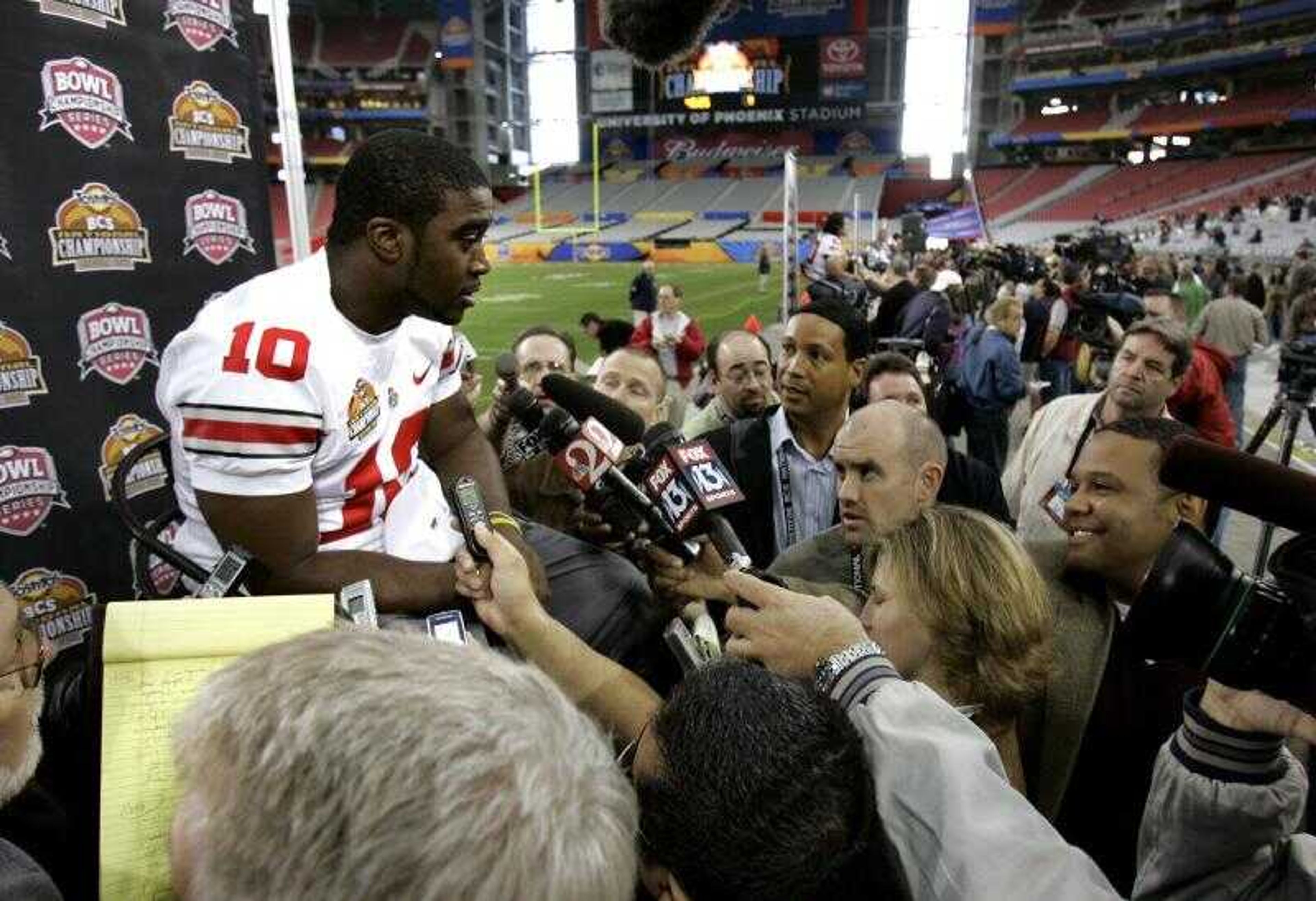Players would like bowl cash
GLENDALE, Ariz. -- Playing in a bowl is no longer reward enough for some college football players:~ While the payout for the BCS Championship is $17 million, the players will only receive a handful of gifts. Some Buckeyes and Gators want a cut of the millions being generated by the championship game...
GLENDALE, Ariz. -- Playing in a bowl is no longer reward enough for some college football players:~ While the payout for the BCS Championship is $17 million, the players will only receive a handful of gifts.
Some Buckeyes and Gators want a cut of the millions being generated by the championship game.
"We all deserve more money," Ohio State senior guard T.J. Downing said. "We're the reason this money's coming in. We're the guys out there sacrificing our bodies. We're taking years off our lives out here hitting each other, and we're not being compensated for it."
Instead, players from top-ranked Ohio State and No. 2 Florida received portable satellite radios and commemorative wristwatches, first-class meals and VIP treatment at posh resorts.
"I've got to admit, sometimes I look in my hand and look in their hand," Florida defensive tackle Joe Cohen said, referring to the Bowl Championship Series. "I believe players should get a little bit more than what they're getting. I don't want to sound like I'm greedy. It's just reality.
"I believe players should be paid, because I'm broke."
Cohen chuckled when he said it, but it's no laughing matter for the NCAA, which has steadfastly maintained that players -- or student-athletes, as the association refers to them -- are amateurs and cannot be paid. It's right there in Bylaw 2.9 of the NCAA Manual: "Student participation in intercollegiate athletics is an avocation, and student-athletes should be protected from exploitation by professional and commercial enterprises."
But bowls have become increasingly commercial. Fourteen different commercial logos appeared Friday inside University of Phoenix Stadium, where media day was held.
Bowl payouts have been mushrooming, too. According to the Football Bowl Association, this year's 31 bowl games will generate $210 million for NCAA schools. Over the last six years, bowls have paid schools $900 million, the association said, and it estimates bowl payouts will grow to $2.2 billion over the next 10 years.
Meanwhile, the Phoenix area expects to reap $350 million in tourism revenue from its three bowl games this year -- the Insight, the Fiesta and the BCS title game.
Plus, Fox is in the first year of a four-year deal that will pay the BCS $320 million for the broadcast rights to the Fiesta, Orange and Sugar bowls from 2007-10 and the national title game from 2007-09.
Little of this money trickles down to the players. The NCAA has set a $500 limit on gifts they can receive from bowl hosts.
Some players shrugged when asked about the money they help generate.
Ohio State quarterback Troy Smith, who won the Heisman Trophy, said he doesn't mind that others profit from sales of his No. 10 jersey, the garment of choice among Buckeyes fans.
"I think what you get is what you deserve," he said. "Thinking about getting revenue off jerseys right now, for me, is definitely not my thinking. That doesn't bother me at all."
Officials and coaches from Florida and Ohio State said paying players would not be practical.
According to 2005-06 U.S. Department of Education figures, Florida reported a total of 538 male and female athletes and said it spent $5.3 million on athletic scholarships. Ohio State reported a total of 996 athletes and said it spent $11.3 million on athletic scholarships.
Florida athletic director Jeremy Foley said he heard questions about pay-for-play at the men's basketball Final Four in Indianapolis last spring, where the Gators won the national title.
"There's a philosophical side of the conversation," Foley said. "But there's a realistic side. I don't see how you have a system in place that just pays men's basketball and football players. Then it becomes just a pure dollars-and-cents issue."
Ohio State coach Jim Tressel agreed.
"Down the road, for the revenue-generating kids, there are careers out there," he said. "If you become one of the great ones, you can maybe generate some income for yourself."
Count Tressel among those experiencing a BCS windfall. He received a $200,000 bonus for leading the Buckeyes into the title game. If Ohio State wins, his current contract specifies he can negotiate a new agreement just six months after signing one that will pay him more than $2.6 million this season.
As the money pours in, the debate isn't likely to end soon.
"I can't sit here and say, 'Hey, I need more money,' because the money they're giving us for college, and money they're giving us for rent, the money we're getting for food is plenty enough for me," Ohio State sophomore linebacker Marcus Freeman said. "But you see people at the next level [the NFL] doing the same thing, and then you hear how many millions that the school is getting for playing in a game like this, and you're saying to yourself, 'Man, give us just a little bit more.' "
Connect with the Southeast Missourian Newsroom:
For corrections to this story or other insights for the editor, click here. To submit a letter to the editor, click here. To learn about the Southeast Missourian’s AI Policy, click here.







